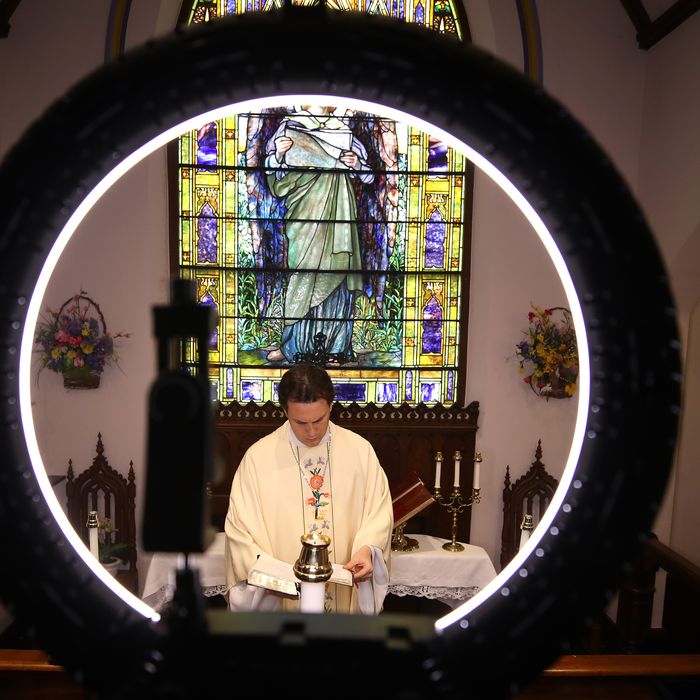
Reading Tara Isabella Burton’s explanatory essay in the New York Times about the millennial underground movement she calls “Weird Christianity,” this old Boomer felt a strong sense of déjà vu. In another time of cultural upheaval, in the early 1970s, I was pulled out of militant atheism (itself bred by a conservative evangelical upbringing) by exposure to the self-same traditional Christian aesthetics celebrated by Burton as an antidote to a “crisis of modernity and the liberal-capitalist faith in individualism.”
Once again, young people are recognizing that Christianity can be counter-cultural rather than a way to give divine sanction to conventional secular society. And the art, music, and worship practices associated with pre-modern Christianity are sufficiently alien to secular sensibilities that they can feel “punk,” and a refuge from the failed self-confidence of modern life so evident in a global pandemic.
Like “punk” culture itself, the world of traditional Christian aesthetics can wear down into something less exotic once you are immersed in it for a while. Burton talks about quarantined people finding “transcendence” and comfort in virtually watching priests celebrate a Latin Mass. That’s appropriate: The essence of the pre-Vatican II Mass was its non-participatory character; it was something worshipers mostly watched, and that was often celebrated more for the benefit of the dead — whose bequests bankrolled the Western Church for centuries — than for the living. The liturgical reforms of Vatican II abolished the Latin Mass and substituted (in the U.S., anyway) sentimental folk music and bad arrangements of Protestant hymns, but also made the Mass a truly communal experience.
Similarly, Burton mentions the pleasures of the “liturgically elaborate” Episcopal Rite I Eucharist, which I loved in my days as an Anglo-Catholic Episcopalian. Only gradually did I comprehend that for all its gorgeously archaic language, Rite I was less “Catholic” than the modern Rite II, and was loaded with signs of its principal author Thomas Cranmer’s desire to move the Church of England towards what his era considered “modern” and “individualistic” worship practices. “Traditional” or “old” doesn’t necessarily mean more faithful to the kind of rigorous or meaningful religion “Weird Christians” seek.
There is no question that for contemporary millennials, the usages of pre-modern Christianity can become a means of rebelling against liberal relativist culture and its distant cousin, capitalist economics. But if the revolt again modernity is undertaken seriously, you can’t pick and choose like those “Cafeteria Catholics” whom Tradpunks likely despise. For every Latin Mass fancier who looks to pre-capitalist Christianity as an inspiration for left-wing solidarity with workers and immigrants, there’s someone who just as authentically finds refuge in pre-Enlightenment attitudes towards women, homosexuality, class privilege, and the fate of lesser breeds. Some Weird Christians may be Christian Socialists, but others are undoubtedly proto-fascists — both viewing capitalism as the work of the devil.
The conservative controversialist Rod Dreher, quoted by Burton at some length, may be best known for promoting the “Benedict Option” whereby orthodox Christians are encouraged to retreat from the culture wars and live righteously in their own enclaves. Like others in Burton’s world, Dreher found contemporary faith expressions lacking:
“As a teenager in the 1980s, I thought Christianity was either the boring middle class at prayer, or it was Jimmy Swaggart’s hellfire Pentecostalism,” Mr. Dreher told me. “Neither one spoke to me.”
Dreher converted to Roman Catholicism, and later to Eastern Orthodoxy, a considerable distance from most of the religious folk who share his political and cultural predilections. But you get the sense he’d come down from the mountain-top in a heartbeat to celebrate an illiberal political regime that made his idea of godly living the norm.
Anyone yearning to “transcend” the tedious and philistine comforts of liberal individualism, it seems, is welcome as Weird Christians, who find in old-school rites and dogmas a more “demanding” faith than is offered by the pallid belief-systems of their fellow-citizens. But like any incarnational religion, Christianity requires a constant tension between transcendence and immanence — the divine and the human, reconciled in Christ. That means living in the real, liberal-capitalist America, which is no more wicked that the medieval principalities with which the pre-modern church lived intimately and uneasily. I don’t see much of a future for some of the coalitions Weird Christians are apparently trying to build:
Leah Libresco Sargeant, a Catholic convert and writer who describes her views as roughly in line with that of the American Solidarity Party, which combines a focus on economic and social justice with opposition to abortion, capital punishment and euthanasia, rejects capitalist notions of human freedom.
In my own Boomer evolution, I eventually came to see a religious life based mostly on the beauty of old and essentially unliving liturgical traditions as a sort of idolatry that represented, at best, an escape from the true and sometimes aesthetically unsatisfying demands of being Christian in an imperfect world. I drifted from Anglo-Catholicism — a nineteenth-century English re-imagining of a sixteenth-century English religious compromise — towards the plain American creed of the Disciples of Christ, who celebrate communion weekly but without the “bells and smells” I still miss. We don’t necessarily deal with the challenges of modern society any better than others, but do try to cherish America’s distinctive contribution to Christianity: pluralism which reserves to voluntary communities the right to hold wildly divergent notions of how to live with oneself and each other. Dogmatists are offended by it, and aesthetes find it boring, and it doesn’t offer the revealed and transcendent truth many who are struggling through a pandemic crave. But in the long history of Christianity, pluralism is perhaps the Weirdest idea of all.
"danger" - Google News
May 11, 2020 at 06:00AM
https://ift.tt/35Z58w9
The Allure and Danger of Anti-Modern Religion - New York Magazine
"danger" - Google News
https://ift.tt/3bVUlF0
https://ift.tt/3f9EULr
No comments:
Post a Comment